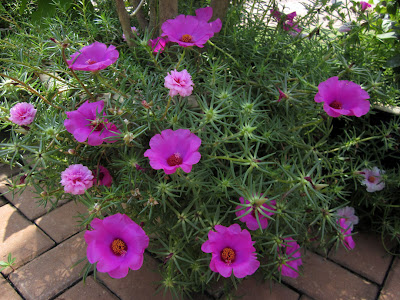
A pot fully draped with portulaca grandiflora of the brazilian variety. Their blooms are large averaging about 2" in diameter compared to the usual ones.
Two varieties, the white & pink bicolour and the fuchsia grace the rim of a pot of bougainvillea
These are real eye candy. This intense fuschia colour is most attractive and would brighthen up any garden
They are sun worshippers but will wilt if the heat gets too strong by late afternoon. The blooms last a day but they will always be a fresh crop the next day.
Curiously the stigma is positioned towards the side and bottom of the whole mass of stamens. Towards the later part of the day the pollen pods would burst and scatter its contents. However the easier and preferred method of propagating is by stem cuttings. Simply just nick some thick stems and push them into some rich soil. No rooting hormone is needed at all; they practically thrive like weeds. In about two days they'll look fine and dandy with sturdy blooms.
Delicate petals flutter with the softest of breeze
An unlikely mix of both types is seen on this particular flower
The double petal flowers are smaller
The double petal flowers are smaller

A swath of double petal blooms.
Portulaca are also commonly called moss rose or Japanese rose

the purest white

powder pink
Portulaca are also commonly called moss rose or Japanese rose

the purest white

powder pink
two toned variety of white and pink
peachy and pretty
orange ones grab the eyes
peach colour with blushes of pink
Fuchsia ones are the original portulaca colour
Poopoo scoop for Tasha, my chihuahua mix-breed on a bed of Portulaca
Tasha sporting a portulaca bloom behind her ear
















Simply gorgeous! Looks like a small carnation! Cutie little dogie!
ReplyDeleteThey are indeed lovely flowers and add much colour and flavour to any garden. Their full glory is amply displayed in the morning. It's a pity they don't last till evening.
ReplyDeleteThe Brazilian variety is just stunning. You've got a beautiful selection of doubles as well. Great collection and great photos. Tasha looked lovey too with the Portulaca flower in her hair.
ReplyDeleteThanks. I saw that you have a 'yellow with orange centre' variety in your recent post. That is so beautiful.
ReplyDeleteI have to place the portulaca behind Tasha's ear. Anything in front would be scratched off as soon as it is placed.
These pictures are simply stunning!! I don't think I've seen the Brazilian variety. Beautiful post!
ReplyDeleteThanks to blogger of nature rambles. Enjoy your interesting blog. Lots of fauna development.
ReplyDeletealoha,
ReplyDeletei'm a fan especially of the doubles...for some reason they die back like annuals for me even in the tropics. i've tried them as salads and they are delicious!
Dear Noel, I live right in the tropics too and the Hibiscus is our national flower. However I've never heard of anyone trying them out as salads!
ReplyDeleteI love portulaca for its nonstop color in the summer. Your variety is lush and beautiful.
ReplyDeleteYes, there add so much colour and gaiety to any garden.
ReplyDeleteI just love those-I need some cuttings! LOL
ReplyDeleteHaha, wish I could just easily courier them to you.
ReplyDeleteHi, Those single-flowered Portulaca are stunning. I've never seen that single, fuschia cultivar available in Australia and it seems to be quite rare in horticulture generally. Can you please tell me where you obtained the seed (i.e. which company sells it)? Have you saved any seed from your plants? You can't send cuttings overseas but it is okay to send seed. Maybe you could sell some seed on eBay? :-)
ReplyDeletePortulacas are so easily propagated from cuttings, so we never bother about seeds.
Delete